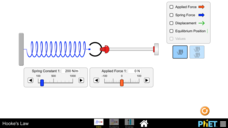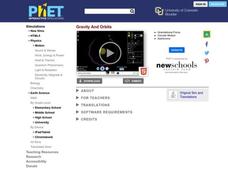PHET
Projectile Motion
Have you ever wanted to shoot someone out of a canon? This simulation gives you that chance! In addition to a human, you can shoot a car, a piano, a cannon ball, and many other items. Scholars set the angle, initial speed, mass, air...
PHET
Ohm's Law
Why did Mr. Ohm marry Mrs. Ohm? He couldn't resistor. An electrifying simulation allows scholars to control both voltage and resistance in order to see the current change. The formula is displayed and as you increase one variable, it...
PHET
My Solar System
Orbit diagrams appear to be a work of mathematical art. The simulation helps scholars build their own systems of planets, stars, moons, etc., to observe their orbits. By altering their positions, velocities, and masses, a variety of...
PHET
Hooke's Law
Everything from pens to cars use springs — some are just on a larger scale! An interactive simulation encourages pupils to stretch and compress springs while observing the changes to force, displacement, and potential energy. Then they...
PHET
Masses and Springs
Have you ever stretched out a Slinkie so much it wouldn't go back to its original shape? Slinkies, like all springs, follow Hooke's Law. A simulation uses springs and masses to demonstrate kinetic, potential, and thermal energy. It...
PHET
John Travoltage
Did you get to play with electric currents or were you grounded? An electrifying simulation shows how building up a charge of electricity creates a static shock once grounded. Pupils rub John's foot across the carpet and view the buildup...
PHET
Gravity And Orbits
Have you ever wanted to turn off gravity? This simulation allows learners to do just that in addition to altering other variables. Scholars can move the sun, Earth, moon, and space station to see how distance affects gravitational pull....
PHET
Forces and Motion: Basics
How is tug of war related to pushing a refrigerator? Here's a simulation connects these two activities with Newton's First Law of Motion. Four different simulations allow scholars to explore net force with tug of war, motion with pushing...
PHET
Electric Field of Dreams
What is the largest electric field in the world? The world itself! This explains why you use a magnetic compass to determine direction. During the simulation, scholars add charges to their electric field to see how the field reacts....
PHET
Forces in 1 Dimension
A realistic simulation uses charts to show forces, position, velocity, and acceleration versus time based on how the simulation is set up. Once those concepts are mastered, scholars use free body diagrams to explain how each graph...
PHET
Fluid Pressure and Flow
This simulation begins with an exploration of water pressure and atmospheric pressure. In the flow portion, scholars reshape a pipe and see fluid dynamics at work. The water tower portion encourages pupils to determine how water...
PHET
Faraday's Law
Could a flux capacitor really work? An engaging simulation encourages scholars to investigate Faraday's law. They experiment with various speeds, magnitude, voltage, and different-sized coils. Hopefully experimenters will be able to...
PHET
Energy Skate Park: Basics
Keep calm and half pipe. An exciting simulation teaches pupils about energy transfer from potential to kinetic and thermal as a skater moves through a half pipe or other track. After a brief introduction, scholars can build their own...
PHET
Energy Skate Park
Apply the concepts of conservation of energy to a skater to introduce a fun way the concepts apply to real life. Scholars build tracks, ramps, and jumps then analyze the various types of energy and friction. For an added challenge,...
PHET
Forces and Motion
The average American will move 12 times, which results in a lot of moving furniture! Class members consider the forces required to move objects with a creative simulation that opens with the forces required to push a filing cabinet....
PHET
Faraday's Electromagnetic Lab
"But still try, for who knows what is possible." - Michael Faraday. Faraday's advice features in a simulation that permits pupils to play with a bar magnet in order to make a light bulb glow connecting electromagnetic induction to...
PHET
Energy Forms and Changes
Is the ice cooling down the water or is the water melting the ice? Here is a simulation that explores thermal energy transfer with iron, brick, and water. It demonstrates the flow of energy and what happens when each material is either...
PHET
The Greenhouse Effect
How do greenhouse gases impact temperature? Have your classes use the interactive software to explore different concentrations of greenhouse gases and their effect on climate. Learners can recreate different atmospheric concentrations...
PHET
Simplified MRI
Cancerous tissues contain more water than normal tissue, which causes the cancerous tissue to resonate longer on the screen and be seen. High school learners can see how MRIs detect tumors in someone's head. Radio transmitters emit their...
PHET
Planetary Magnetism
What do magnetic fields look like? The best way to learn about magnetic fields is to try identifying them for yourself. Scholars will understand the importance of magnetic fields after completing this experiment. The extension activities...
PHET
Planet Designer: What’s Trending Hot?
Excite scholars to design their own planet in this first of five lessons. The lesson plan starts with a pre-activity assessment, a complete lesson plan that is easy to implement, and a post-activity assessment that would look great...
PHET
Planet Designer: Retro Planet Red
What does the atmosphere on Mars look like? This fourth lesson plan in the series of five is designed for high schoolers. Scholars apply previous knowledge to add atmosphere to Mars in an online simulation. This comprehensive lesson plan...
PHET
Planet Designer: Martian Makeover
Mars used to have liquid water, can you make it come back? Use the instructional activity and simulation to understand why Mars lost its magnetic field, why atmosphere is important, and what gravity has to do with it. This is...
PHET
Measuring the Interplanetary Magnetic Field
Scientists need to figure out how to measure interplanetary magnetic fields, but the magnetic field of the spacecraft is interfering with their readings. Scholars attempt to solve the problem that has perplexed NASA scientists for years.

























